The Ladies' Diary
Heath is best known as a contributor to The Ladies' Diary , from 1737. He was taken onto the staff, and proposed the prize essays for 1739, 1740, 1742, 1746, and 1748. When Henry Beighton, editor of the Diary, died in October 1743, the proprietors, the Stationers' Company, allowed Beighton's widow to run it with Heath as her deputy. In that capacity Heath exercised full editorial control from 1744 to 1753, and continued to write under his own and assumed names. [1]
A personal quarrel with Thomas Simpson led Heath to denigrate in print Simpson's Doctrine of Ultimators (1750) and Doctrine of Fluxions (1751), while praising related works on the same subject by William Emerson. John Turner, [2] who like Emerson was a contributor to the Diary, inserted in his Mathematical Exercises (1750–3) a defence of Simpson against Heath, signed "Honestus". In 1753 the Stationers' Company dismissed Heath and installed Simpson in the editorial chair. [1]
Works
John Holmes and his Greek grammar were attacked by Heath and Robert Hankinson in a controversy from the period 1738–40. Holmes wrote in his own defence, and had support from Thomas Simpson. [3] Heath also published on the longitude problem. [4] He had a reputation for indecent writing and innuendo in the Town and Country Magazine and The Rambler's Magazine. [5]
While editor of the Ladies' Diary, Heath started in 1749 a journal on similar lines of his own account, The Palladium, which then ran for nearly 30 years, to 1778, under changing titles. [6] It was said that he poached for it better contributions sent to him as editor of the Diary. [1]
Heath wrote A History of the Islands of Scilly, with a Tradition of the Land called Lioness, and a General Account of Cornwall. The book, published in London in 1750, and dedicated to the Duke of Cumberland, included a new map of the isles, drawn by Heath from a survey made in 1744; it was reprinted in 1808 in John Pinkerton's Voyages and Travels, ii. 729–784. His other works included: [1]
- The Practical Arithmetician, 1750.
- Truth Triumphant: or Fluxions for the Ladies, 1752; part of the controversy with Simpson and Turner. [7]
- The Ladies' Chronologer, No. I. 1754 (amalgamated with the Palladium of 1755).
- The Ladies' Philosopher, No. I. 1752, II. 1753, III. 1754.
- Astronomia Accurata; or the Royal Astronomer and Navigator, 1760.
- General and Particular Account of the Annular Eclipse of the Sun which happened on Sunday, April 1, 1764.
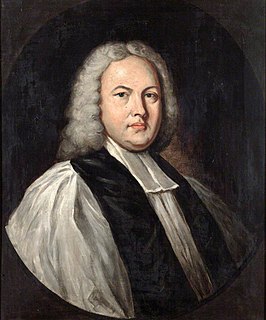
William Warburton was an English writer, literary critic and churchman, Bishop of Gloucester from 1759 until his death. He edited editions of the works of his friend Alexander Pope, and of William Shakespeare.

Robert Darcy, 4th Earl of Holderness,, known before 1721 as Lord Darcy and Conyers, was a British diplomat and politician.
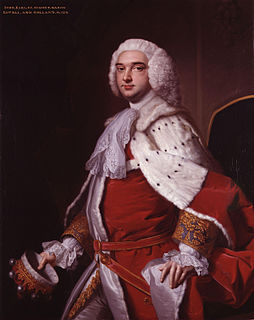
John Perceval, 2nd Earl of Egmont, PC, FRS was a British politician, political pamphleteer, and genealogist who served as First Lord of the Admiralty.

William Borlase, Cornish antiquary, geologist and naturalist. From 1722, he was Rector of Ludgvan, Cornwall, where he died. He is remembered for his works The Antiquities of Cornwall and The Natural History of Cornwall (1758), although his plans for a parish-by-parish county history were abandoned.

Granville Leveson-Gower, 1st Marquess of Stafford, PC, known as Viscount Trentham from 1746 to 1754 and as The Earl Gower from 1754 to 1786, was a British politician from the Leveson-Gower family.
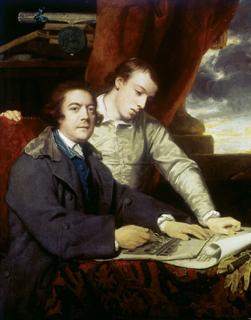
James Paine (1717–1789) was an English architect.

Edward Haytley was an English portrait and landscape painter of the 18th century. He was born in 1713, but his works are documented to the period 1740–1764; other biographical detail is equally sparse, but the background of some early professional associates and early sitters suggests he may have come from Lancashire.
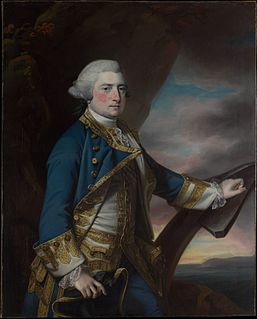
Admiral Harry Powlett, 6th Duke of Bolton PC was a British nobleman and naval officer.
James Brydges, 3rd Duke of Chandos PC, styled Viscount Wilton from birth until 1744 and Marquess of Carnarvon from 1744 to 1771, was a British peer and politician.

Admiral of the Fleet Sir William Rowley KB was a Royal Navy officer. He distinguished himself by his determination as commander of the vanguard at the Battle of Toulon in February 1744 during the War of the Austrian Succession. He went on to be Commander-in-Chief of the Mediterranean Fleet in August 1744 and successfully kept the Spanish and French fleets out of the Mediterranean area but was relieved of his command following criticism of his decision as presiding officer at a court-martial.
Daughters of Light: Quaker Women Preaching and Prophesying in the Colonies and Abroad, 1700-1775 is a book by Rebecca Larson, published in 1999. It provides specific studies of 18th century women ministers, evidencing the progressive nature of Quaker views on women.

Hugh Hume-Campbell, 3rd Earl of Marchmont PC FRS, styled Lord Polwarth between 1724 and 1740, was a Scottish politician who sat in the House of Commons from 1734 until 1740 when he succeeded to the peerage as Earl of Marchmont. He sat in the House of Lords as a representative peer from 1750.
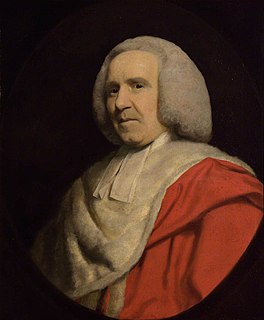
John SmithD.D. was a British academic and astronomer.
Michael Lort (1725–1790) was a Welsh clergyman, academic and antiquary.
James Fortescue, D.D. (1716–1777), was an English poet.
Richard Rolt was an English writer, also known as a poet and librettist.
Edward Kimber (1719–1769) was an English novelist, journalist and compiler of reference works.

Henrietta Knight, Baroness Luxborough, was an English poet and letter writer.

Richard Vernon was a British horse breeder and trainer and a politician who sat in the House of Commons between 1754 and 1790.
This page is based on this
Wikipedia article Text is available under the
CC BY-SA 4.0 license; additional terms may apply.
Images, videos and audio are available under their respective licenses.
![]()












